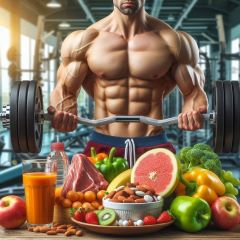Building strong, toned muscles is a goal for many fitness enthusiasts, athletes, and individuals looking to improve their overall health and physique. However, achieving this goal requires more than just lifting weights; it necessitates a well-rounded approach that includes proper diet and nutrition. This article will delve into the essential elements of nutrition that support muscle growth, recovery, and overall health, providing practical tips and insights to help you on your journey.
Understanding Muscle Building: Nutritional Basics
Role of Macronutrients in Muscle Growth
Macronutrients—proteins, carbohydrates, and fats—are the three primary nutrients that provide energy and support bodily functions. Each macronutrient plays a unique role in muscle building:
- Proteins are crucial for muscle repair and growth. They are made up of amino acids, the building blocks of muscle tissue. Consuming adequate protein is essential for muscle hypertrophy, especially after resistance training.
- Carbohydrates are the body’s primary energy source. They fuel workouts and help replenish glycogen stores in muscles after exercise. Adequate carbohydrate intake is vital for sustaining energy levels and optimizing performance.
- Fats are essential for hormone production and overall health. Healthy fats support the absorption of fat-soluble vitamins and provide a concentrated energy source.
Importance of Protein Intake for Muscle Repair and Synthesis
Protein intake is paramount for anyone looking to build muscle. After a workout, muscle fibers experience micro-tears, and protein helps repair these tears, leading to muscle growth. The general recommendation for individuals aiming to build muscle is to consume approximately 1.6 to 2.2 grams of protein per kilogram of body weight daily. High-quality protein sources include lean meats, poultry, fish, eggs, dairy products, legumes, and plant-based proteins like quinoa and tofu.
Balancing Carbohydrates and Fats for Energy and Hormone Production
While protein is vital, carbohydrates and fats should not be neglected. Carbohydrates are crucial for providing the energy needed for intense workouts. They also play a role in insulin production, which is important for muscle growth. Healthy fats, such as those found in avocados, nuts, seeds, and fatty fish, support hormone production, including testosterone, essential for muscle development.
Micronutrients and Their Role in Muscle Contraction and Recovery
Micronutrients, including vitamins and minerals, play a significant role in muscle function and recovery. For example, calcium and magnesium are essential for muscle contraction, while vitamin D supports calcium absorption. Antioxidants like vitamins C and E help combat oxidative stress caused by intense exercise, promoting recovery. A varied diet rich in fruits, vegetables, whole grains, and lean proteins can help ensure adequate micronutrient intake.
Designing a Muscle-Building Diet: What to Eat
Creating a Balanced Meal Plan Tailored to Muscle Gain
A well-structured meal plan is key to achieving muscle-building goals. A balanced diet should include a mix of macronutrients, with an emphasis on protein. Here’s a sample meal plan for a day focused on muscle gain:
- Breakfast: Scrambled eggs with spinach and whole-grain toast, topped with avocado.
- Snack: Greek yogurt with mixed berries and a handful of almonds.
- Lunch: Grilled chicken breast with quinoa and steamed broccoli.
- Snack: Hummus with carrot and cucumber sticks.
- Dinner: Baked salmon with sweet potatoes and asparagus.
- Evening Snack: Cottage cheese with pineapple or a protein shake.
Food Sources of High-Quality Protein
When selecting protein sources, aim for high-quality options that provide all essential amino acids. Some excellent sources include:
- Animal-based: Chicken, turkey, lean beef, pork, fish, eggs, and dairy products (milk, yogurt, cheese).
- Plant-based: Lentils, chickpeas, beans, quinoa, tofu, tempeh, and edamame.
Incorporating Healthy Carbs Like Whole Grains, Fruits, and Vegetables
Carbohydrates should be prioritized, especially around workouts. Focus on complex carbohydrates that provide sustained energy. Good sources include:
- Whole grains: Brown rice, quinoa, oats, whole-grain bread, and pasta.
- Fruits: Bananas, berries, apples, and oranges.
- Vegetables: Leafy greens, sweet potatoes, bell peppers, and carrots.
Inclusion of Healthy Fats from Sources Like Avocados, Nuts, and Fish
Healthy fats are vital for hormonal balance and overall health. Incorporate sources such as:
- Avocados
- Nuts and seeds: Almonds, walnuts, chia seeds, and flaxseeds.
- Fatty fish: Salmon, mackerel, and sardines.
- Olive oil and coconut oil for cooking and dressings.
Timing is Everything: Nutrient Timing for Optimal Gains
Pre-Workout Nutrition Essentials for Energy and Performance
What you eat before a workout can significantly impact your performance. Aim to consume a meal or snack rich in carbohydrates and moderate in protein about 1-2 hours before exercising. This could be a banana with peanut butter, a smoothie with fruit and yogurt, or oatmeal with nuts.
Post-Workout Recovery Meals to Refuel and Replenish
After a workout, your muscles need nutrients to recover. Aim to consume a meal or snack within 30-60 minutes post-exercise that includes both protein and carbohydrates. This could be a protein shake with a banana, a turkey sandwich on whole-grain bread, or a bowl of Greek yogurt with granola.
Daily Meal Spacing to Maintain Steady Nutrient Flow
To support muscle growth, it’s essential to eat regularly throughout the day. Aim for 4-6 meals or snacks spaced every 3-4 hours to maintain a steady flow of nutrients. This approach helps prevent muscle breakdown and supports recovery.
Night-Time Nutrition Tips for Overnight Muscle Growth
Don’t overlook the importance of nighttime nutrition. Consuming a slow-digesting protein source before bed can help with muscle recovery. Options include cottage cheese, casein protein powder, or Greek yogurt. Pair it with a small amount of healthy fat, such as nut butter, to enhance satiety.
Debunking Myths: Common Misconceptions About Diet and Muscle Gain
The Myth of the Protein Overdose: How Much Is Too Much?
A common misconception is that consuming excessive protein leads to better muscle gains. While protein is essential, there is a limit to how much the body can utilize for muscle synthesis. Consuming more than the recommended amount does not necessarily equate to more muscle growth and may lead to unnecessary calorie intake.
How Carbs Are Essential, Not Detrimental, to Muscle Building
Another myth is that carbohydrates should be avoided for muscle gain. In reality, carbohydrates are vital for energy and muscle recovery. They replenish glycogen stores, which are depleted during workouts, and support overall performance.
Fats: Inclusive in Muscle-Building Diets Without Adding to Body Fat
Many people fear dietary fats, thinking they will lead to weight gain. However, healthy fats are crucial for hormone production and overall health. Including them in moderation can support muscle growth without contributing to excess body fat.
The Truth About Supplements and Muscle Enhancement
While supplements can be beneficial, they should not replace whole foods. Protein powders, creatine, and branched-chain amino acids (BCAAs) can support muscle growth when used appropriately, but they are not magic solutions. A balanced diet should always be the foundation of any muscle-building strategy.
Hydration and Muscle Health: Why It Matters
Essential Role of Water in Muscle Contraction and Joint Lubrication
Water is often overlooked but is critical for muscle function. Adequate hydration supports muscle contraction, nutrient transport, and joint lubrication. Dehydration can lead to decreased performance and increased risk of injury.
Signs of Dehydration and Its Impact on Strength and Performance
Signs of dehydration include thirst, dry mouth, fatigue, dizziness, and reduced urine output. Even mild dehydration can adversely impact strength, endurance, and overall performance. It’s crucial to drink water consistently throughout the day, particularly before, during, and after workouts.
Hydrating Options: Beyond Just Water
While water is the best choice for hydration, other options can help maintain fluid balance. Consider:
- Electrolyte drinks for intense workouts or hot weather.
- Coconut water for natural electrolytes.
- Fruits and vegetables with high water content, like watermelon, cucumbers, and oranges.
Effective Strategies for Maintaining Hydration Throughout the Day
To stay hydrated, consider the following strategies:
- Carry a water bottle with you and set reminders to drink regularly.
- Drink a glass of water with each meal and snack.
- Monitor your urine color; light yellow indicates proper hydration.
Lifestyle Choices: Sustainable Habits for Long-Term Muscle Health
Choosing Whole Foods Over Processed Alternatives
Focusing on whole, minimally processed foods is essential for muscle health. Whole foods provide essential nutrients, fiber, and antioxidants that support overall health and recovery. Aim to fill your plate with colorful fruits, vegetables, whole grains, lean proteins, and healthy fats.
Consistency in Diet and Exercise for Sustainable Results
Building muscle is a gradual process that requires consistency in diet and exercise. Establish a routine that includes regular strength training and a balanced diet. Track your progress and adjust as needed, but remember that sustainable changes take time.
Importance of Rest and Recovery in Muscle Growth
Rest and recovery are just as important as exercise and nutrition. Muscles need time to repair and grow stronger. Ensure you sleep well each night (7-9 hours) and incorporate rest days into your workout routine. Active recovery, such as light stretching or walking, can also aid recovery.
Mindful Eating Practices to Support Metabolism and Muscle Repair
Practicing mindful eating can enhance your relationship with food and support your muscle-building goals. Pay attention to hunger cues, savor each bite, and avoid distractions during meals. This approach can help prevent overeating and support better digestion.
Conclusion
Building strong, toned muscles requires a holistic approach encompassing proper diet, nutrition, hydration, and lifestyle choices. By understanding the role of macronutrients and micronutrients, designing a balanced meal plan, timing your nutrients effectively, debunking common myths, staying hydrated, and adopting sustainable habits, you can set yourself on the path to achieving your muscle-building goals. Remember that consistency and patience are key; with the right approach, you can develop a strong, healthy physique that lasts a lifetime.
This post contains affiliate links. If you purchase through these links, I may earn a commission at no extra cost.




Hi there –
This article resonates with me because I have been on a quest to gain more muscle. I picked up some tips, like eating 1-2 prior to a workout. Most of the time, I just go to the gym without snacking. Also, consuming micronutrients is essential to reducing stress and promoting recovery.
Overall, this is a timeless article which is a great resource for anyone who wants to stay in shape.
Cheers,
G
Thanks. I really appreciate your comment.
This comprehensive guide on muscle building and nutrition is incredibly informative! It covers all the essential aspects of macronutrients, micronutrients, and hydration, which are crucial for anyone looking to build muscle.
I particularly appreciate the emphasis on the importance of protein for muscle repair and growth, as well as the role of carbohydrates and fats in energy and hormone production.
Thanks for providing such a thorough overview of the nutritional basics for muscle building!
Thank you, Shaun, for your fantastic comment.